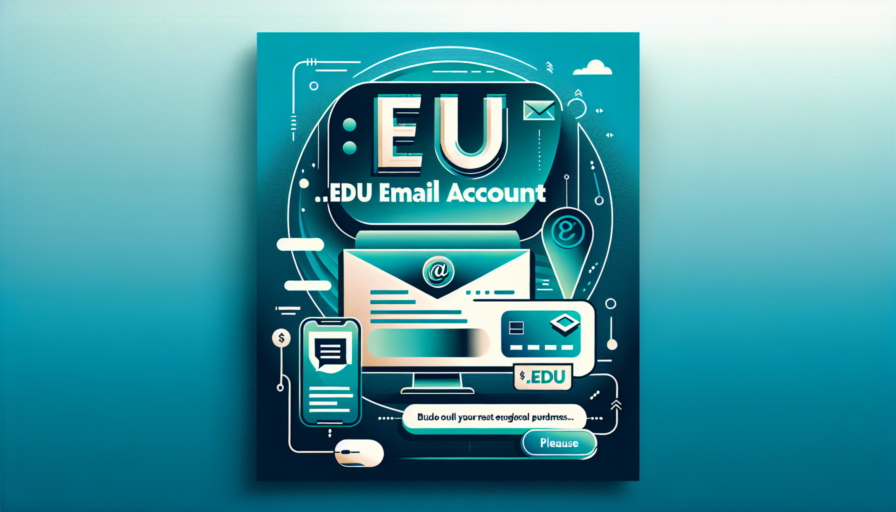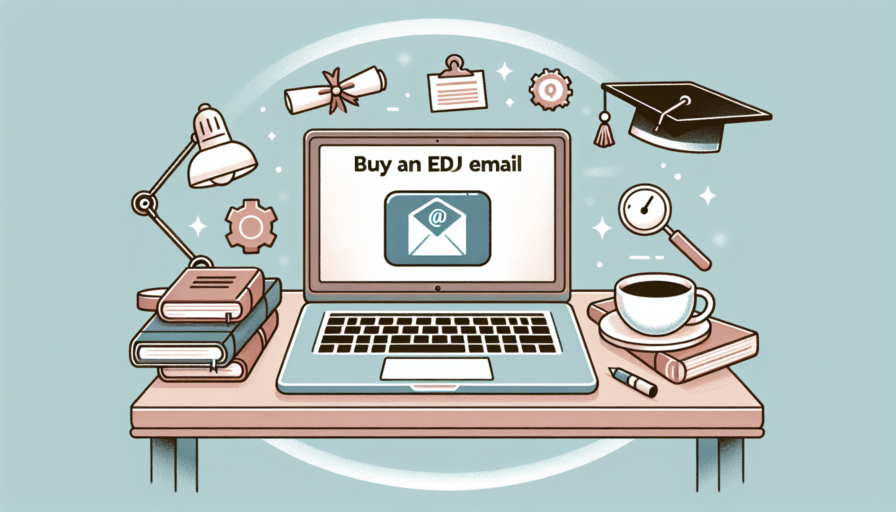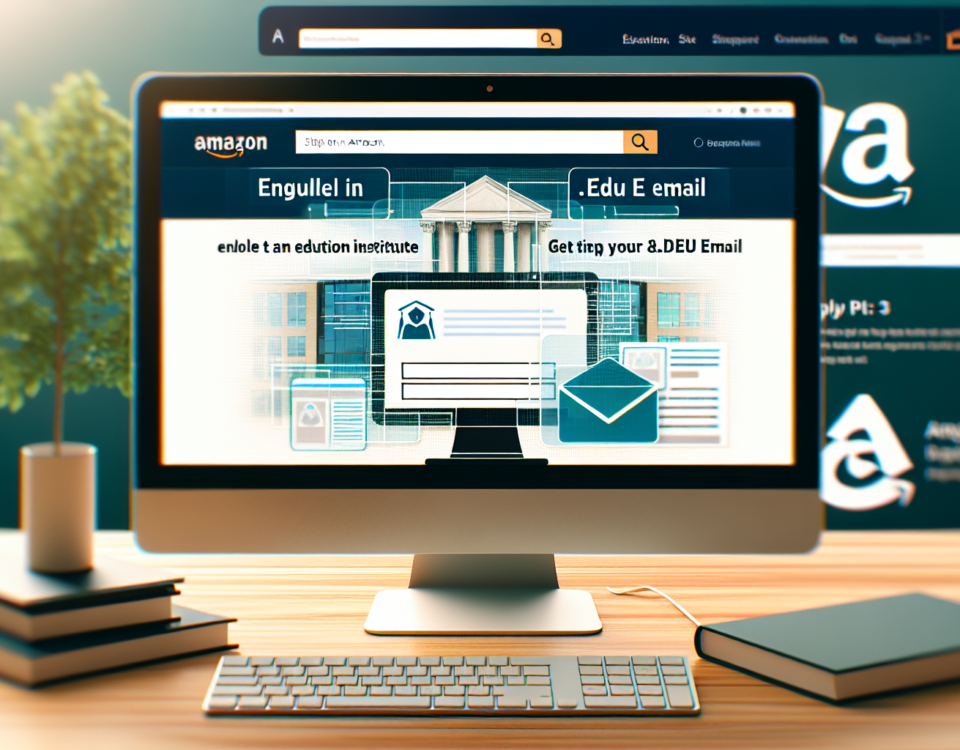
Outlook EDU Login Guide: Access Your Educational Email with Ease
February 15, 2024Get Your EDU Email for Free: A Step-by-Step Guide to Unlocking Academic Benefits
February 15, 2024What Are EDU Emails and Who Can Benefit From Them?
EDU emails are email addresses provided by colleges and universities to their students, faculty, and sometimes alumni. These email accounts are generally granted to individuals with an official relationship with the institution and they typically end with the domain extension .edu, which is reserved for educational establishments in the United States. The significance of EDU emails lies in their association with credible educational organizations, which often leads to various perks and services being available exclusively through these email addresses.
Students are the primary recipients of EDU email addresses; these accounts serve as a key resource for academic communication. They are used to register for classes, access educational resources, communicate with professors and peers, and receive notifications about campus events. In many cases, an EDU email is a student’s digital identity within the academic community. Additionally, these emails are sometimes offered to prospective students during the application process to facilitate communications regarding admissions and financial assistance.
Faculty members and educators also gain through EDU emails, as they establish a professional channel for corresponding with colleagues, submitting research, and discussing educational methodologies. These emails often play a crucial role in expanding their professional network within the academic sphere. Alongside faculty and students, alumni may retain access to their EDU emails, keeping them connected to their alma mater and informed about alumni events, networking opportunities, and other benefits.
Moreover, EDU email addresses unlock a multitude of benefits beyond campus communication. Various software and service providers offer substantial discounts and free access to educational resources, recognizing the .edu extension as an indicator of academic involvement. This includes free or discounted access to online courses, software licenses, library resources, and subscription services specifically tailored for educational use. The scope of these benefits can extend to a wide audience, including part-time students, researchers, and non-traditional learners who are associated with the educational institution granting the EDU email.
As a web blogger, it’s important to emphasize the value of an EDU email address through engaging and informative SEO content. Here’s how one might approach this topic:
The Top Advantages of Having an EDU Email Address
For students and educators, an EDU email address is more than just a way to communicate electronically. It’s a gateway to a plethora of benefits that can enrich the educational experience and even provide financial advantages. Users with an EDU email address often gain access to exclusive academic discounts on software, hardware, and services that are essential for both learning and teaching.
Software Discounts and Free Access are perhaps the most notable perks associated with EDU email addresses. Companies like Microsoft, Adobe, and Autodesk offer significant price reductions or even complimentary access to their products for educational use. This helps in reducing the cost burden on students and facilitates educators with up-to-date tools to prepare their curriculum.
Extended Cloud Storage and Enhanced Email Capabilities
Verifying your academic status with an EDU email can unlock extended storage options on cloud services like Google Drive and Dropbox. This advantage means not just more space to store class-related material, but also improved email capabilities, such as increased attachment size limits. Such enhancements are conducive to a smoother, more efficient education process.
Access to Scholarships and Education Programs
Moreover, with an EDU email address, students can gain exclusive access to scholarships and specialized education programs not available to the general public. This can be an incredible asset for those seeking financial aid or opportunities to study abroad. Educational institutions and philanthropic organizations often use EDU email addresses as a criterion to qualify for such programs, making it an indispensable tool for ambitious learners.
In summary, owning an EDU email address unlocks a variety of benefits that go far beyond the campus boundaries. These advantages support both personal and educational development, making it a valuable asset for anyone involved in higher education.
Step-by-Step Guide on How to Obtain an EDU Email
When it comes to unlocking the vast array of educational resources and discounts available online, having an EDU email address is akin to holding a golden key. For students and educators, the journey to obtaining this prized email extension is straightforward and can be accomplished by following a series of simple steps.
Check Your Eligibility
The first step in procuring an EDU email is to ensure you are eligible. Typically, .edu emails are reserved for individuals affiliated with accredited educational institutions such as universities or colleges. Students, faculty, and staff are usually eligible to apply for an EDU email as part of their association with the institution. If you are unsure about your eligibility, it’s advisable to check with your educational institution’s IT department or administrative office.
Register with Your Institution
Once you have verified your eligibility, the next step involves registering with your educational institution. This process generally requires providing personal details such as your name, date of birth, and student or employee ID number. Some institutions may require additional documentation to confirm your identity and association with the organization. After successfully registering, you will often be guided through setting up your official .edu email account.
Activation and Usage
With registration complete, you will typically receive an activation link via a secondary email address or direct communication from your institution. It’s crucial to follow the provided instructions carefully to activate your new EDU email account. Once activated, you can begin to take advantage of the benefits that come with it, such as access to educational software licenses, online library databases, and exclusive discounts on products and services targeted towards the educational community. Remember, it’s important to adhere to your institution’s policies regarding proper use and the maintenance of the EDU email account.
Unlocking the Full Potential: Making the Most of Your EDU Email
Educational email addresses, typically ending in ‘.edu’, are gold mines of resources and opportunities for students and educators alike. These email addresses are not just gateways to email communication within academic circles but also serve as keys to a repository of benefits and exclusive offers that go well beyond the campus boundaries. Having an EDU email can unlock a plethora of digital goods and services, often at little to no cost, which can contribute significantly to both academic and personal growth.
Exclusive Educational Discounts and Offers
The most compelling advantage of an EDU email is access to a wide range of educational discounts. Renowned software companies like Microsoft and Adobe offer substantial markdowns on their products for users registering with an EDU email. Not only does this facilitate financial savings, but it also ensures that students and educators work with industry-standard tools, thus enhancing their skills with professional software. Similarly, many e-commerce platforms provide special deals and promotions, including reduced subscription fees for services like Amazon Prime and Spotify, tailor-made for the student budget.
Apart from software and e-commerce, an EDU email address opens doors to a wide array of academic resources and libraries. Students can gain free or heavily discounted access to scholarly articles, journals, and books, which otherwise might be behind steep paywalls. This is especially vital for research and staying current with the latest academic advancements in their field of study.
Boosting Your Academic Networking
Networking is an underestimated aspect of academic and professional success and having an EDU email address can be your ticket to prestigious academic networks and communities. Platforms such as LinkedIn offer free premium accounts or enhanced networking opportunities for those with an EDU email, enabling students to connect with alumni, industry leaders, and potential employers. This connectivity fosters relationships and opportunities that can lead to internships, job offers, and collaborative projects that might otherwise remain out of reach.
Additionally, many conferences, seminars, and academic webinars offer complimentary or reduced entry fees for EDU email holders. This not only provides a platform for learning and exposure but also allows for the exchange of ideas and knowledge with peers and experts across the globe.
Maximizing Productivity and Collaborative Projects
Modern education heavily relies on collaboration and productivity tools, and students with an EDU email address are given free or preferential access to these platforms. Google Workspace for Education and Microsoft’s Office 365 Education are stellar examples where students and educators can collaborate on projects in real time, manage assignments, and streamline communication effectively at no additional cost. Leveraging these tools not only promotes a collaborative learning environment but also ingrains important digital literacy skills that are critical in today’s technology-driven world.
It is essential to explore and take advantage of the full spectrum of features offered by your EDU email. Often, educational institutions themselves provide detailed guides or portals where you can discover the specific benefits available to you. By actively seeking out these opportunities and integrating them into your educational arsenal, you can significantly enhance your academic experience and set yourself up for a successful future.
Best Practices for Securing and Maintaining Your EDU Email Account
Strong Passwords and Regular Updates
One fundamental component of securing your EDU email account is the creation and maintenance of a strong password. This password should be a complex mix of uppercase and lowercase letters, numbers, and symbols, to reduce the likelihood of unauthorized access. It’s essential to avoid using easily guessable information such as significant dates or common words. Moreover, regular updates to your password compound its effectiveness, with experts recommending a change every three to six months. Two-factor authentication (2FA) adds an additional layer of security, ensuring that even if your password is compromised, access to your account remains gated behind a second verification process.
Phishing Scams and Suspicious Emails
Phishing scams are a prevalent threat, with attackers often disguising themselves as trustworthy entities to mislead you into providing sensitive information. Vigilance is key when handling emails that request personal data or direct you to unfamiliar websites. It is crucial to verify the authenticity of all correspondences sent to your EDU email account. Double-check the sender’s email address, look for grammatical errors, and be skeptical of any message that incites urgency to share personal information or login credentials. Remember, legitimate organizations will not ask for your password or other sensitive information via email.
Regular Account Monitoring and Software Updates
Continuous monitoring of your EDU email account activity is a proactive step towards securing your digital identity. Check for any anomalies such as logins from unknown locations or times. Many email providers supply tools that enable you to review recent activity. Alongside this, it is vital to keep software, especially your antivirus and anti-malware programs, updated. These will protect your system from malicious software that could compromise not only your email account but your entire digital footprint. Email encryption is another technique which can help safeguard the data you send and receive, particularly important when dealing with sensitive academic information.
Clean Inbox Management
Maintaining a clean and organized inbox can significantly contribute to the security and efficiency of your EDU email account. Regularly cleaning out old emails and organizing your messages into folders can help you stay on top of your account’s content and increases your ability to detect any unauthorized changes or usage. Avoid the use of public Wi-Fi networks for accessing your EDU email when possible, as these networks can be less secure and more vulnerable to interception. When using such networks, employ a trusted Virtual Private Network (VPN) to ensure that your email communications are encrypted and secure.







